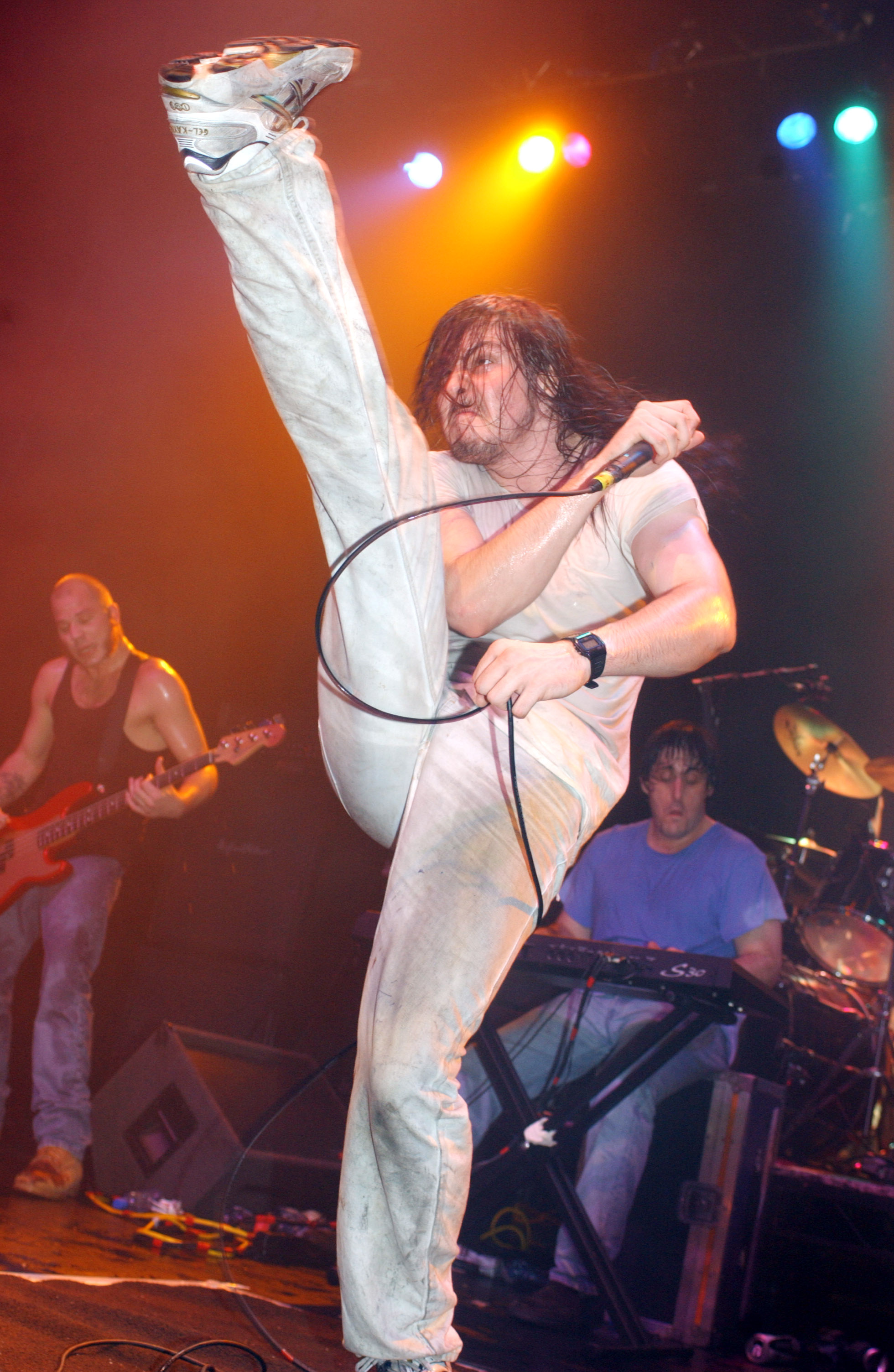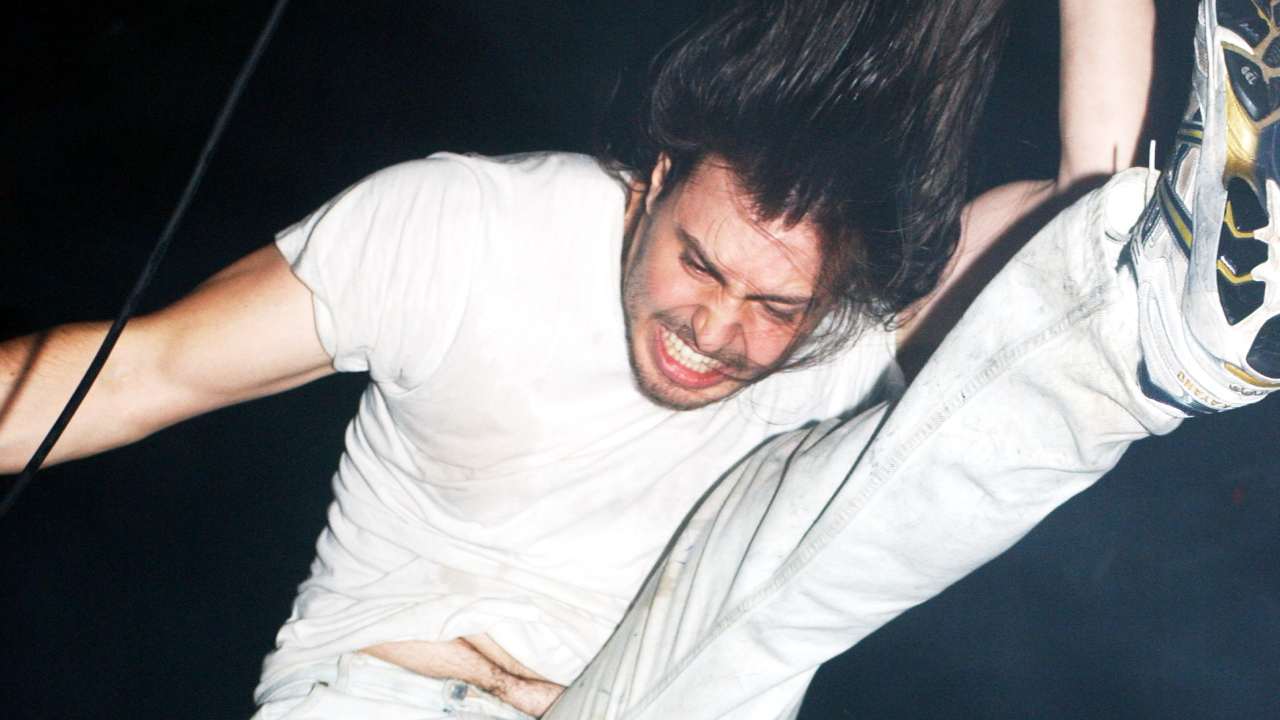It’s October 2001. One month has passed since the 9/11 terror attacks on New York. Grief and fury mix like a Molotov cocktail on the streets of America. George W Bush’s war machine rolls into Afghanistan to extract Osama Bin Laden, while back home, popular culture is defanged to soothe a raw nation, with a list of 160 ‘lyrically inappropriate songs’ allegedly delivered to US radio stations. The West will spend the next decade looking over its shoulder. The party is over.
Andrew W.K. just wasn’t made for those times. His debut single, Party Hard, was ostensibly everything that post-9/11 society could not tolerate, particularly if viewed in tandem with its video: dressed in grubby whites like some anti-Messiah, in the mirror of a sinister, strip-lit bathroom the singer inspects deep facial cuts; a robot voice gabbles: “When-it’s-time-to-party-we-will-party-hard”. Then begins an adrenalin shot of pop-metal whose chant of ‘Let’s get a party going!’ seemed deeply out of place amid the debris and body bags.
The consensus was split: W.K. was either a beer-chugging rock pig in the Mötley Crüe tradition, or an ironymonger deconstructing the clichés of the rock lifestyle. In fact he was neither, revealing himself in the press as Andrew Wilkes-Krier, a soft-spoken former piano prodigy from Michigan. Similarly, while most listeners inferred (wrongly) that Party Hard was about alcohol, it’s never mentioned in the lyrics.
“In 1998 I’d just moved to New York,” Andrew recalls. “I had never been drunk, I didn’t do any drugs and I didn’t have any friends. I spent a huge amount of time at home alone, which was pretty much what I did all my life. I never was a very social person. I had always felt awkward at parties; social interaction was tricky for me. But I loved the atmosphere of being at a party, the way it felt in the air, so creating music that encouraged partying was a no-brainer."
“I didn’t want anyone to feel they had to act a certain way to ‘party’,” he says of song’s lyric. “I’d had many life experiences that told me something about me was wrong, or I couldn’t be part of this club… all that crap. I hated being at a party and someone coming up and saying: ‘Why aren’t you drinking?’ ‘Why aren’t you dancing?’ So I thought, I’m gonna make a song telling people to party, but party however they want. I never dictated what people should specifically do.”
The lyrics of Party Hard were settled, but Andrew had his moment of musical clarity in the pit at a Sonic Youth show. “The goal of the song was a physical reaction,” he recalls. “I’ve had experiences where music doesn’t just change the thoughts in my head, it changes the way my body feels. With Party Hard I wanted to push that as far as I possibly could… to change your whole state of being.
“I wanted it to start with a riff that was one note,” he continues. “I had a vision of being on stage and the sound is just ‘duh! duh! duh!’ No chord changes, everyone playing just one note with as much intensity as they could. I wanted it to be this… heartbeat. There was no question as to whether I would include piano. It’s a real rock’n’roll instrument, it’s percussive, it has power. And it’s all I could play.”
That didn’t stop Andrew recording every instrument on an initial demo of Party Hard, a “skeleton” that he says remains on the final version, albeit beneath the parts played later by session musicians.
“I was clear this was going to be ‘my song’,” he recalls of the result. “I had a strong feeling it would make other people go crazy and run around the room. It’s got a giddy kind of energy, like it’s the last day of school, or you’re about to go down a roller-coaster. That feeling of breaking through all the bullshit and confusion that tells us that it’s not amazing to be alive.”
But that was before 9/11. After the twin towers fell, voices higher up the record company food chain questioned whether America wanted to ‘get the party going’.
“There was a big debate,” says Andrew, “because they thought putting that song out would be suicide and I would never recover. In the early days there was a lot of debate over how safe we should play it. I would get coached on what I should say in interviews. They’d say don’t talk too much about having fun or enjoying your life, because there’s a lot of people out there who are miserable.”

Andrew saw it another way: “At that moment, celebrating what you had was never more important. To be grateful for the life we have and this incredible city… it’s all just hanging by a thread. Is singing about having fun just a big waste of time, and a disgrace? Or is putting people in touch with the parts within them that make them feel good in fact a very worthwhile pursuit? The feelings of joy and power that come from music – that’s what allows humanity to rise up and be at its best. If everybody was singing songs on 9/11 instead of flying planes into buildings, it wouldn’t have happened.”
Party Hard got its release, and Andrew’s instincts were vindicated by the response it received, with the song storming the US and UK charts and thrusting its author onto a famous NME cover with the (admittedly hyperbolic) headline: ‘The Saviour Of Rock’.
Refreshingly, Andrew is neither jaded by its ubiquity or tired of chalking it up on the set-list: “Drop it? Oh God, no. I love it more every day. It’s given me so much, brought me so many opportunities and happiness, and I hope into the lives of other people. I bow down to this song. I don’t feel like it’s mine, it’s just a song I got to play. I could never imagine a day not playing it. I’ll die playing that song – and that would be a great privilege.”

